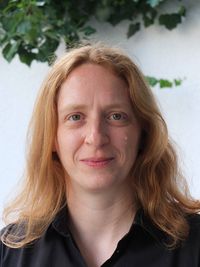Prof. Dr. Anke Pohl
Project leader

Professor
Universität Bremen
E-mail: apohl(at)uni-bremen.de
Telephone: +49-421-218-63661
Homepage: http://user.math.uni-bremen.de/apohl/
Project
70Spectral theory with non-unitary twists
Publications within SPP2026
In the framework of infinite ergodic theory, we derive equidistribution results for suitable weighted sequences of cusp points of Hecke triangle groups encoded by group elements of constant word length with respect to a set of natural generators. This is a generalization of the corresponding results for the modular group, for which we rely on advanced results from infinite ergodic theory and transfer operator techniques developed for AFN-maps.
Related project(s):
70Spectral theory with non-unitary twists
We provide Fourier expansions of vector-valued eigenfunctions of the hyperbolic Laplacian that are twist-periodic in a horocycle direction. The twist may be given by any endomorphism of a finite-dimensional vector space; no assumptions on invertibility or unitarity are made. Examples of such eigenfunctions include vector-valued twisted automorphic forms of Fuchsian groups. We further provide a detailed description of the Fourier coefficients and explicitly identify each of their constituents, which intimately depend on the eigenvalues of the twisting endomorphism and the size of its Jordan blocks. In addition, we determine the growth properties of the Fourier coefficients.
| Journal | Commun. Number Theory Phys. |
| Volume | 17, no. 1 |
| Pages | 173-248 |
| Link to preprint version | |
| Link to published version |
Related project(s):
70Spectral theory with non-unitary twists
We study the spectral properties of the Laplace operator associated to a hyperbolic surface in the presence of a unitary representation of the fundamental group. Following the approach by Guillopé and Zworski, we establish a factorization formula for the twisted scattering determinant and describe the behavior of the scattering matrix in a neighborhood of \(1/2\).
Related project(s):
70Spectral theory with non-unitary twists
We present the Laplace operator associated to a hyperbolic surface \(\Gamma\backslash\mathbb{H}\) and a unitary representation of the fundamental group \(\Gamma\), extending the previous definition for hyperbolic surfaces of finite area to those of infinite area. We show that the resolvent of this operator admits a meromorphic continuation to all of \(\mathbb{C}\) by constructing a parametrix for the Laplacian, following the approach by Guillopé and Zworski. We use the construction to provide an optimal upper bound for the counting function of the poles of the continued resolvent.
Related project(s):
70Spectral theory with non-unitary twists

